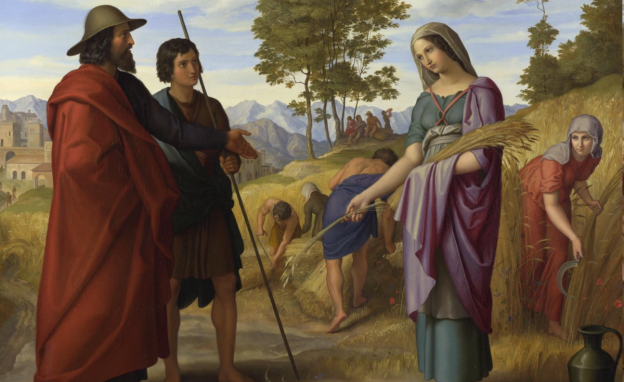Christmas is a time when we reflect on God’s goodness to us in sending Jesus, our Redeemer, to dwell with us. Jesus, though our great king, was born and lived his life as a servant. Through Jesus’ birth, God’s redemption plan for sinners headed towards its climax as a baby rested in a lowly manger in Bethlehem.
In the book of Ruth we have seen the story of God’s goodness shown to Ruth and Naomi. In Ruth 4, this story is completed as Boaz ensures that Naomi and Ruth are cared for by fulfilling the role of redeemer, and providing (with Ruth) a son to carry on the family line. Yet the final verses demonstrate how this story fits into God’s redemption plan, and ultimately leads to the birth of a greater servant and redeemer for us all, Jesus.
True to his promise to Ruth at the threshing floor the night before (3:13), Boaz went to the town gate the next morning to ensure a resolution for Ruth and Naomi (v.1). This was the place for deals and commerce. There, Boaz summoned the city elders and nameless closer redeemer to do business, politely referred to as “friend” in our translations but literally Mr “so-and-so” (vv.1-2).
Once they were gathered, Boaz raised the subject of Naomi and the land which she had inherited from her deceased husband and sons (v.3). Naomi needed to sell the right to use this land to raise money on which to live, since she could not raise crops on it herself, so was Mr So-and-so interested in purchasing the land as redeemer or was it free for Boaz to buy? (vv.3-4).
This sounded like the Deal of the Decade, so Mr. So-and-so quickly agreed. But then Boaz pointed out that the deal came with “Ruth the Moabite, the widow of the dead, in order to perpetuate the name of the dead in his inheritance” (v.5).
Suddenly the Deal of the Decade sounded like a dud, since Mr. So-and-so would have to support Ruth, Naomi, any children born to Ruth to carry on Elimelech’s line, and see no benefit to his own children (v.6).
Unlike Mr. So-and-so who only believed in charity at a profit, Boaz believed in self-sacrifice for God and his people, so he took the right of redemption from Mr. So-and-so, bought Naomi’s land, and agreed to marry Ruth despite the personal financial cost to himself (vv.7-10).
For this act, the elders and bystanders at the gate praised Boaz and blessed him and Ruth, that they may be parents of a great multitude of descendants (vv.11-12). After this, Boaz married Ruth and, sure enough, a child was born (v.13). While Ruth had remained childless for ten years, married to Mahlon in Moab, God gave her a child to Boaz in the Land of Promise.
However, this was not just Ruth’s son, but also a descendant for Naomi (v.14). Through Boaz, Naomi’s loss was redeemed and restored with the arrival of a son to inherit the family land and carry on the family line. Further, in her old age this son would be able to care for Naomi, ensuring her health and security (v.15). All this from a gentile Moabitess who turned out to be worth seven sons in value, through her faith in God.
As the grandson sat on Naomi’s lap, emptiness became fullness (v.17). Obed, “a servant”, was given to make whole Naomi, who was bitter (“Mara”) no longer.
Yet one final twist remains in this story. Obed had a son in time, named Jesse. Jesse in turn had sons, one of whom would be a king after God’s own heart, named David (v.17). This is confirmed in the genealogy of vv.18-20, which draws our eyes to Matthew 1, and the birth of another servant and redeemer; Jesus.
In Ruth 3 we saw that Boaz was a redeemer for Ruth and Naomi, and a type of Christ our redeemer. In Ruth 4 we see this play out in a way which nobody in that book could have expected.
Boaz was not like Mr. So-and-so, motivated only by what was in it for him. Boaz was motivated by love of God and love of God’s people, willing to sacrifice and count the cost to himself for the sake of Naomi and Ruth.
In the same way, Christ was not motivated by what was in it for himself but took “the form of a servant, being born in the likeness of men” (Phil. 2:7). Christ was willing to sacrifice his eternal glory and riches, and count the cost in his life and his death to redeem us, God’s people, from our sins and bring fullness where there was only the bitterness and emptiness that comes from sin and rebellion against God.
Just as in Ruth 4, a servant baby, Obed, was born in Bethlehem to advance God’s salvation plan, so too at Christmas we rejoice that another servant baby, Jesus, was born in Bethlehem to advance God’s salvation plan.
Merry Christmas everyone.

